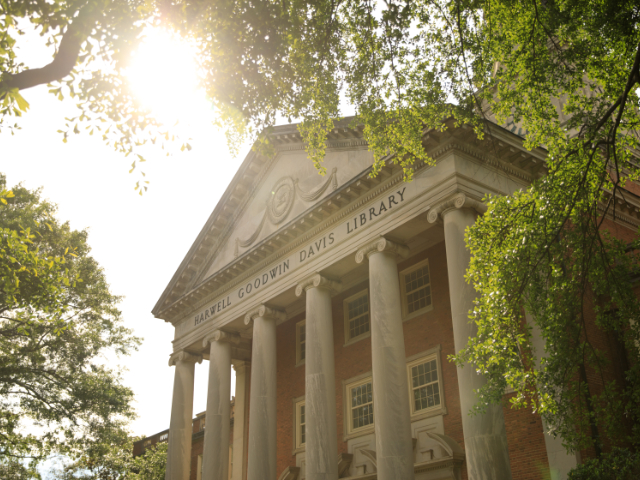
From civil rights to religious life, women in Alabama have significantly contributed to the history of the state since its founding in 1819. Samford University was founded as Howard College just 22 years later in 1841. As such, the university has watched the history of women in Alabama unfold from the ratification of the 19th Amendment, civil rights, shifting workplace dynamics, notable missionaries, authors, government leaders, and much more.
Samford’s Special Collection and University Archives at Harwell Goodwin Davis Library seeks to document the history of the university, the state of Alabama and its people, and Alabama’s religious institutions through the acquisition of historically significant, rare and unique materials.
In 2022, Judson College, Samford’s sister school transferred the lion’s share of their archives to Samford University to ensure to ensure 183 years of women’s and Baptist history in the state of Alabama are safe and available to researchers despite the college’s closing in 2021.
“Preserving the records and artifacts we have in Special Collection is vital to understanding the stories of those of who came before,” said Jennifer Taylor, chair of the Special Collection and University Archives, “When we examine archival materials that speak to women’s history, it not only shows us how far we have come, but it gives us a chance to celebrate and tell the often unheard stories of pioneering women in Samford’s, and the state of Alabama’s, history.”
Women have been changing the landscape of Samford University since Howard College’s doors opened to female students in 1913. The first female graduate is recognized as Anna Judge Schoellkopf who received a degree in 1896, allowed to enroll as the daughter of a professor. Schoellkopf is one of many “female firsts” at Samford.
Female alumnae have moved on to serve in leading professional, government and social positions that have made significant contributions to the university, state and nation. Angie Proctor Grooms ’66 and Nina Miglionico ’33 became the first two women on the Birmingham City Council. Janie Shores ’68 began her pursuit of the law while a student at Howard College of Arts and Sciences, and became the first woman to serve as a Supreme Court of Alabama. She was ultimately considered as a United States Supreme Court nominee by President Bill Clinton’s administration.
Audrey Gaston Howard, JD ’70, and Elizabeth Sloan Ragland ’73 are trailblazing women in Samford’s history, but not just because of their illustrious careers. Howard was the first woman appointed to the U.S. Attorney’s Office in the southeast and Ragland was a leader in the communications and higher education fields. Both bravely led, Howard was the first African American student to attend Samford and Ragland was the first to integrate university housing.
Today, Samford alumnae are still known for brave and bold success stories. Dulce Rivera ’17, chief executive officer of Mi Pueblo Supermarket and chair of Fiesta BHAM, was included in the most recent publication of the Birmingham Business Journal’s “Top 40 Under 40.” Autumm Jeter ’06, EdD ’12, was recently appointed as the assistant superintendent for the Alabama State Department of Education. Lindy Cleveland ’14 is the recipient of the 2024 Council for Christian Colleges & Universities Young Alumni Award, given to the individual whose work demonstrates uncommon leadership or success that reflects the values of Christian higher education.
Further, many buildings, rooms and academic schools bear the name of some of Samford’s leading ladies. Orlean Bullard Beeson is the namesake for Samford’s Orlean Beeson School of Education and Lucille Stewart Beeson is the namesake of Cumberland School of Law’s library. Jane Brock Recital Hall is named in honor of Jane Hollock Brock and several residential halls are named in honor of women whose significant contributions have improved the life of Samford and its students.
The legacy of women at Samford can also be seen in the university’s Special Collection and University Archives. Students and employees may visit Special Collection and University Archives Monday-Friday from 9 a.m.-5 p.m.; Samford guests must book an appointment for access to materials and are encouraged to contact the Special Collection staff prior to making an appointment. Additionally, several items in the Special Collection are available for viewing online through the Digital Collections website.
“The department continues to grow in the records and items collected. We are interested in collecting additional material that can help us better understand the past and present. We hope the materials placed online help not only the Samford community, but also researchers around the world seeking to understand and write about the history of Alabama,” said Taylor.
Celebrate Women’s History Month by joining Samford in several events and by exploring some of the history around campus and in the University Library.
View some of the items in the digital collection:
- Alumnae Angie Proctor Grooms and Nina Miglionico, first two women on the Birmingham City Council
- Maud McLure Kelly, first female lawyer in Alabama
- Janie L. Shores, first female to serve on the Supreme Court of Alabama and contender for U.S. Supreme Court in 1993. Shores became the first full-time female law faculty member in Alabama, and the second in the Southeast, when she was hired as a law professor at Cumberland School of Law.
- Ida V. Moffett, graduate of Birmingham Baptist School of Nursing, now Moffett and Sanders School of Nursing, was a pioneer of the field and helped to develop licensing training programs for nurses.
- Eugenia Weatherly, first female graduate of Howard College with a traditional four-year degree
- Anna Judge Schoellkopf, first female graduate of Howard College
- “Female Firsts,” Seasons, Summer 2019
Preserving history, maintaining and growing collections is made possible through the generosity of others. Give today to support the preservation of the Samford University Special Collection.
